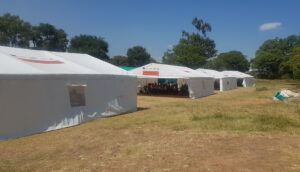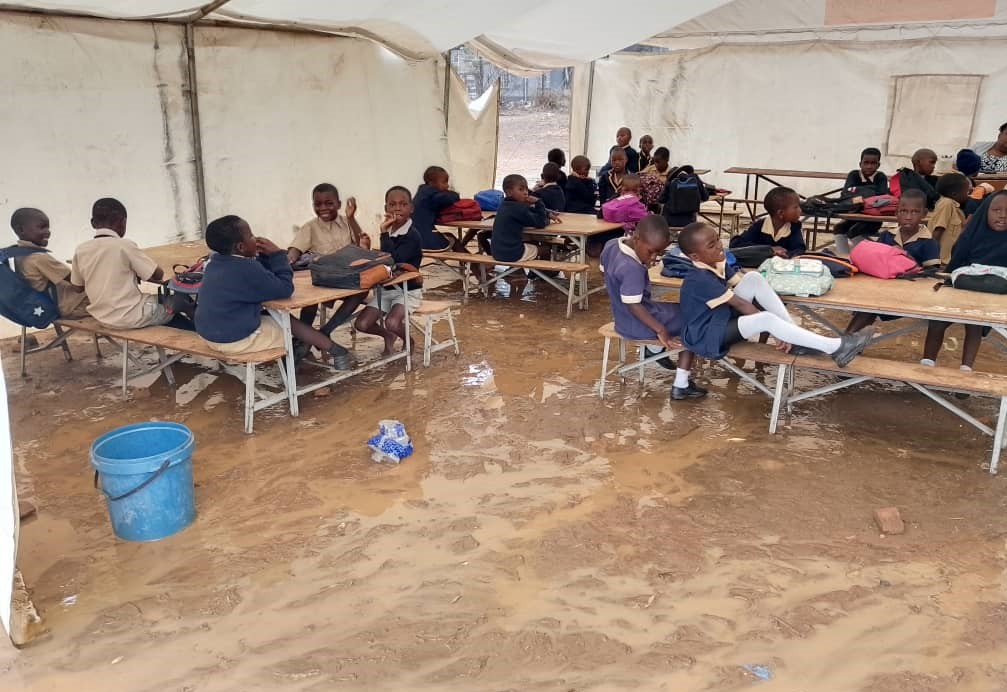By Chipo Gudhe
It was just another chilly May morning in Kwekwe when I dropped off my son at Russell Primary School, his cheeks rosy from the cold, but his pace brisk and excited as he dashed towards his warm classroom. He wore his winter uniform—thick grey trousers, a double-knit green school jersey, and a green anorak zipped up to his chin. As he disappeared into the sturdy brick building, I smiled with motherly contentment, knowing he would be safe and comfortable through the bitter winter day.
But then I saw him. A small boy, no older than seven or eight, trudging slowly toward the edge of the school grounds, where the tents stood like weary soldiers braving the cold wind. He wore a thin jersey, the kind schools issue as part of a standard uniform, and worn-out shoes with one sock peeking through a hole. His arms were tightly folded across his chest, a futile attempt to warm himself against the biting cold.
My heart broke.
That boy is a pupil at Globe and Phoenix Primary School. His school—once a pillar of hope in this gold-rich but neglected town—was condemned in 2023 after a classroom block caved into an underground mining shaft. The collapse, caused by illegal gold panning activity, left the school unsafe and forced hundreds of children to relocate.
Now, they learn in tents at Russell Primary School, thanks to the school’s generosity in offering a portion of its grounds. But tents are not classrooms. They cannot retain heat. They cannot block the icy wind. They offer no protection from the morning frost that blankets Kwekwe in winter, nor from the psychological frost that comes with being treated as second-class students in their own country.
As I watched the boy disappear into his tent-classroom, the contrast between our children’s realities was painfully clear. My son was heading into a warm, solid building that protects and nurtures him. That little boy, like hundreds of others, was walking into a makeshift tent flapping in the wind, where he would sit for hours trying to concentrate as his fingers stiffened from cold.
It is a scene that should outrage every citizen in Kwekwe—and Zimbabwe.
Kwekwe is blessed with gold. Our soil is rich with it. Yet, the wealth that lies beneath our feet has not brought prosperity to the people. Instead, it has attracted greedy individuals—illegal gold panners and powerful mining syndicates—who plunder our land with impunity. The very shaft that swallowed part of Globe and Phoenix Primary School is a grim reminder of how this unregulated greed now directly threatens our children’s lives and futures.
Those who control Kwekwe’s gold mines drive luxury cars and live in mansions while schoolchildren huddle in tents. The irony is cruel and unjust. Globe and Phoenix Primary pupils are not asking for luxury. They are asking for dignity—four solid walls, a roof, a chalkboard, a desk, a chair. The basics.
Yet years after the collapse, these basics remain out of reach.
Following the disaster in 2023, politicians and business leaders rushed to offer support. In the wake of media attention and public outrage, pledges were made to rebuild the school on a newly allocated piece of land. Ceremonial ground-breaking ceremonies were held. Speeches were delivered.
But the pledges have not materialized.
Kwekwe Mayor Albert Zinhanga recently in March expressed his frustration with those who made empty promises:
“You should not pledge for political expedience or for show off in the media, but you should do it out of goodwill and fulfill the pledges rather than give people false hope. We are leaders and we should strive to act on our promises.”
His words ring with the truth so many of us feel. Hope is a dangerous thing to give children when it is built on lies.
Meanwhile, the tents remain.

The conditions these children endure are not just substandard—they are degrading. The tents they learn in are reminiscent of makeshift shelters in war-torn countries or refugee camps. There is no insulation, no electricity, and no protection from the elements. When it rains, the ground turns to mud. When it is windy, dust fills the air and papers scatter. And now, in the cold season, the temperature inside the tents is often just as cold as it is outside.
Teachers do their best to maintain a semblance of learning, but how do you teach mathematics to a shivering child? How do you expect concentration from pupils whose hands are too numb to hold a pencil?
This is not just a discomfort. It is an educational emergency.
Among the silence and broken promises, one voice has emerged with genuine action. The Church of Jesus Christ of Latter-day Saints has pledged to construct seven classroom and administration blocks at the new site for Globe and Phoenix Primary School. It is a welcome sign of commitment—one based not on political gain but on real compassion.
But even this hopeful project is still in its early stages. The children remain in tents for now, and unless more hands join in, they may still be there by the time next year’s winter arrives.
What is the value of gold when it destroys schools? What is the value of wealth when it cannot protect our children?
These are not rhetorical questions—they demand answers from every leader, every businessperson, and every citizen of conscience. Kwekwe’s gold must serve its people, not destroy them. The children of Globe and Phoenix Primary School deserve justice, not tents. They deserve classrooms, not canvases flapping in the wind.
We cannot claim to value education when we allow children to freeze while learning. We cannot claim to care for the future when we let it shiver before our eyes.
The government must urgently step in—not just with words, but with resources. The Ministry of Primary and Secondary Education must prioritise the rebuilding of Globe and Phoenix Primary. Transparency must be demanded from those who promised to help. A community-led task force could be formed to track progress, monitor donations, and ensure accountability.
Local businesses, too, must rise beyond their bottom lines. If even a fraction of the wealth extracted from Kwekwe’s mines were reinvested into schools, the problem would be solved within months if not days. This is not a matter of capability—it is a matter of will.
Above all, ordinary citizens must not be silent. We must continue to raise our voices, to demand dignity for our children. The tents are not acceptable. Not now. Not ever.
As a parent, I cannot unsee that little boy in the thin jersey. His image stays with me—his slow steps, his folded arms, the cold on his face. He could be any of our children.
I think of my son, warm and protected, and I wonder: why should he be more privileged simply because his school hasn’t collapsed?
This is not just about Globe and Phoenix Primary. It is about what kind of society we are willing to be. One that watches children freeze in tents and shrugs? Or one that refuses to look away, and acts?
The children of Kwekwe are our responsibility. The tents are a national shame. Let this winter be the last they endure in those conditions. They deserve more. They deserve better.
They deserve a future built on brick and compassion, not canvas and broken promises.
The tragedy of Globe and Phoenix Primary School is not an isolated incident—it is a mirror reflecting the broader educational crisis facing Zimbabwe. Across the country, especially in remote rural areas, thousands of children are forced to learn in crumbling, makeshift structures with no electricity, no proper furniture, and in some cases, no roofs over their heads. What is happening in Kwekwe is only different because it is visible—because it happened in an urban centre and was triggered by the collapse of a classroom block into a gold mine shaft. But in the forgotten corners of our nation, similar or worse conditions persist silently every day. Our society and government have become numb to these realities, treating education infrastructure as an afterthought rather than a foundation. Until we acknowledge that every child—whether in the heart of a city or the edge of a forest—deserves a safe, dignified place to learn, we will continue to betray the very future we claim to protect. Globe and Phoenix is not just a school in crisis—it is Zimbabwe’s conscience calling out for change.




1 thought on “Shivering Futures: The bitter cold, bleak reality facing Globe and Phoenix Primary pupils”
The Church Of Jesus Christ Of Latter-day saints is on it. They have to bear it a little bit more and soon they will have a school of their own. God bless their little soul. Im grateful to be a member of the church.